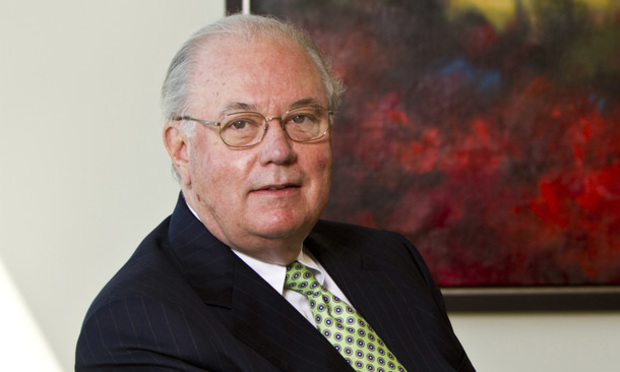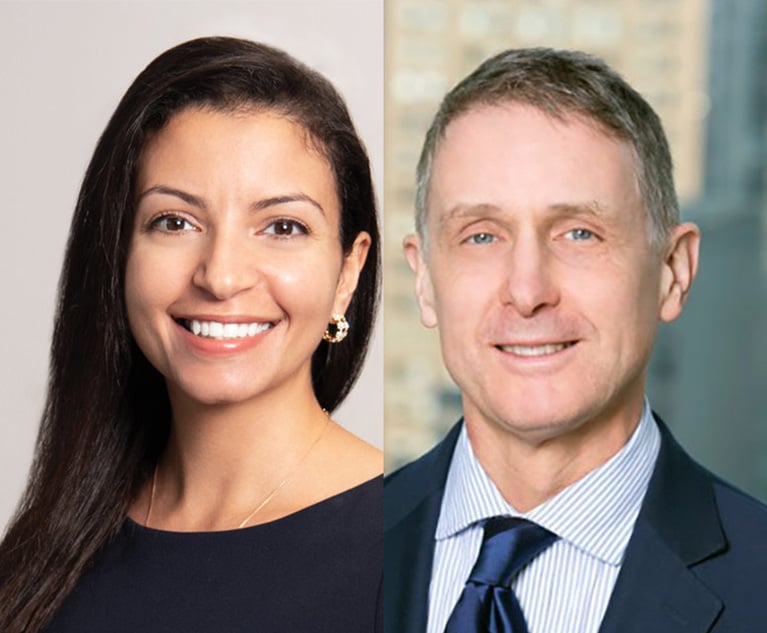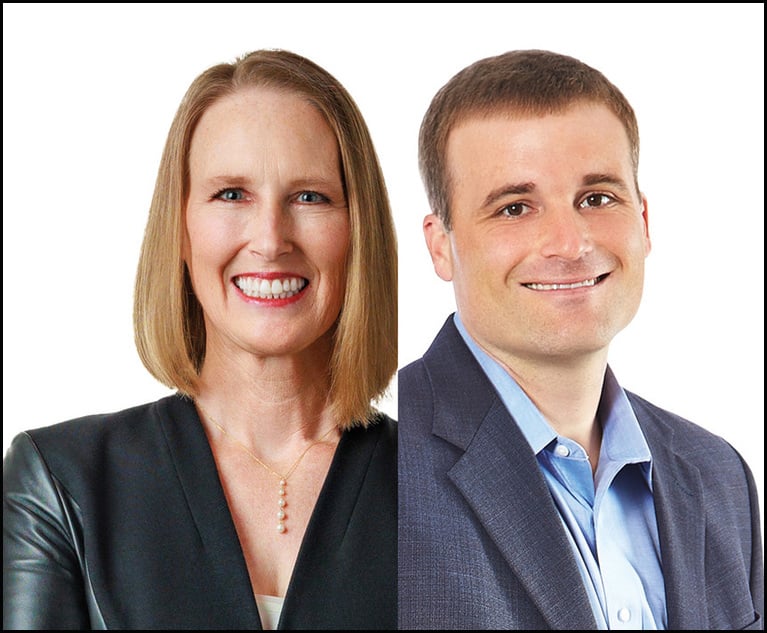Lifetime Achievement: Lash Harrison
A mentor said that lawyers need to listen, if they really want to help their clients. "I have never forgotten that advice," Harrison says.
June 19, 2019 at 02:00 PM
9 minute read
 Lash Harrison, managing partner, FordHarrison (Photo: John Disney/ ALM)
Lash Harrison, managing partner, FordHarrison (Photo: John Disney/ ALM)
Lash Harrison had been a labor and employment lawyer for about 14 years when he embarked on building what is now FordHarrison, a labor and employment boutique with nearly 200 lawyers in 28 cities.
In recent years, the firm has drawn attention for its associate development program, which eliminated a billable hour requirement in a lawyer's first year in practice. It also has a business development program for lawyers aiming for partnership. Harrison also has passionately worked on a host of programs devoted to attracting minority attorneys and advancing their careers at the firm.
FordHarrison's Client Advisory Board was born from Harrison's goal to keep clients' needs at the forefront of business. The board is composed of select senior level executives from top clients and regularly provides candid feedback to improve how the firm services clients.
What drew you to labor and employment law?
When I was in law school at Emory, very few firms had formal summer programs, but a handful of them hired clerks. I thought my best chance as a first year student would be a small firm, so I wrote five or six firms that had fewer than 10 lawyers and requested an interview. I chose the firm that offered me the best salary, and it happened to be a labor law firm. They were very busy that summer, and as a result I had the opportunity to research “live” issues, draft pleadings and have significant client contact. It was much more exciting than the work my classmates who worked at larger firms were doing.
I can't say I had a master plan to be a labor and employment lawyer, but my father was a small business owner, and I was a business major at Emory, so looking at things from a business-oriented perspective came naturally to me. Once I was exposed to it, I was hooked and have never regretted the decision. It's a dynamic area of the law that mirrors what's happening in our culture and our society.
The evolution of our employment laws and our expectations in the workplace have been huge during the time that I've been practicing. Everyone is affected by it. I've found that most employers want to treat their employees fairly, but they can be confused and uncertain about how to proceed. Our job is to help them achieve their business objectives while also complying with legal restrictions. We do a lot of proactive work—management training and counseling—to avoid legal problems, and we help them navigate through the legal framework.
Who was one of your mentors, and what did you learn from this person?
A number of clients took an interest in helping me build my practice, and I developed close relationships with them. I learned the most from Charles Brightwell, who operated a Coca-Cola franchise in Alabama for the family of one of the original franchisees.
Labor and employment is a “people practice,” and I learned a lot about dealing with people effectively from Charlie. For example, once while I was meeting with Charlie in his office, one of his managers came rushing in, very agitated and upset about a pay issue. Charlie interrupted his meeting with me and met with the manager for about half an hour. At the end, the manager stood up, happily thanked Charlie and left. Charlie then told me that listening to others with respect is the most important thing you can do when dealing with any kind of problem. He also added that lawyers in particular need to listen if they really want to help their clients. I have never forgotten that advice.
When you co-founded what became Ford & Harrison in 1978, could you have imagined that the firm would have nearly 200 lawyers in 28 cities? What was your goal for the future?
Our goal in 1978 was to provide excellent client service and create a firm where people wanted to come to work. Those two over-reaching goals haven't changed, but what it takes to achieve them has.
Our goal was to build a firm where lawyers and staff are all fully invested in being members of the client service team. To build that kind of team, you must create a culture where treating everyone with respect is a priority. Partners have to feel that they are in fact the owners of the firm. For that to happen, a firm has to be as open and transparent as possible about firm governance and financial information.
Our goal in 1978 and the goal now is to be committed to the client in front of us today and always looking ahead to what's next. That's what has allowed us to grow from 14 lawyers in Atlanta to where we are today.
Our geographic growth occurred in response to client needs. As employment litigation evolved and became a bigger part of our practice, clients wanted local “boots on the ground” where they had operations.
Today and going forward, providing excellent client service is less about “boots on the ground” and more about technology—efficient delivery of services integrated with our clients' operations, regardless of where our lawyers are. We're looking to improve our data analytics, project management processes and technological infrastructure to ensure seamless connectivity between lawyers and clients.
In 1978, excellent client service certainly didn't require us to have an international presence. Now it does. We are proud of our role as the sole U.S. member of Ius Laboris, a global alliance of law firms specializing in labor and employment. That platform gives us a competitive advantage that few firms our size can boast. It gives our clients access to excellent employment firms in over 50 countries, and we are able to perform U.S. labor and employment work for clients of member firms.
You have created several programs to help lawyers in your firm navigate their careers. How have lawyers' career challenges changed over the years you have practiced?
Over the last 40-plus years, the billable hour, which was fairly new when I joined the profession in 1964, has radically changed how new lawyers are trained and their opportunities for advancement. As a new lawyer, I had the luxury of spending an afternoon at the courthouse watching a trial or “carrying the briefcase” of a seasoned partner sitting across from the union during collective bargaining.
That is a luxury that is rare today. Clients understandably won't pay for training, and associates who are willing to make that investment in their own development have to work that much harder to meet the hours requirements necessary for advancement. Partners are also working harder to “make their hours” and build their practices and have less time for mentoring.
In 2007, FordHarrison decided to shift our focus away from billable hours for first-year lawyers and instead focus on how much they could learn in that first 12 to 15 months on the job. As part of the Year One program, they shadow experienced lawyers and spend several months on secondment inside a client's legal department. FordHarrison doesn't expect clients to pay for these experiences. We make that investment in our lawyers' advancement in the profession.
Likewise, over the course of my career, it's become more difficult for good lawyers to build a practice. Demand for legal services has been more or less flat since the Great Recession, so competition is tough, and law school doesn't include “sales and marketing.” In 2009, our firm started LEAP—a client development program for high potential salaried partners, many of whom were promoted from our associate ranks. They spend two to three years working one-on-one with a legal marketing coach and participating in mock pitch exercises and other training activities led by our business development managers. There's always a wait-list to get into the program, which tells you something about our success rate.
You have been active in diversity efforts. What is a common misconception about diversity?
One of the biggest misconceptions is that law firms are investing in diversity solely because clients are demanding it. I feel strongly that we are a stronger firm when our makeup reflects both the makeup of our clients and the makeup of the communities in which we practice.
Diversity has been a priority for FordHarrison since the beginning, and it's never been a stand-alone “department.” For diversity efforts to be successful, you have to commit from the top down, and you have to integrate diversity into all aspects of the firm's operations—most importantly into firm governance. When the firm appointed our diversity partner, Dawn Siler-Nixon, we added a seat for that position to our executive committee, which is our firm's most important decision-making body.
All of this isn't to say that achieving diversity is easy. The pipeline of diverse candidates graduating from law school is not growing, and in addition to competing with one another, law firms are competing with Fortune 500 companies and a wide field of government and public service positions. Firm leaders can't delegate responsibility for progress to a diversity partner or the recruiting department or substitute their clients' commitment for their own and expect to make progress. We haven't made diversity a priority just to win awards, but I am pleased that our success has been recognized by many organizations.
This content has been archived. It is available through our partners, LexisNexis® and Bloomberg Law.
To view this content, please continue to their sites.
Not a Lexis Subscriber?
Subscribe Now
Not a Bloomberg Law Subscriber?
Subscribe Now
NOT FOR REPRINT
© 2025 ALM Global, LLC, All Rights Reserved. Request academic re-use from www.copyright.com. All other uses, submit a request to [email protected]. For more information visit Asset & Logo Licensing.
You Might Like
View All
On The Move: Energy Infrastructure Pro Joins Moore & Van Allen, Adams & Reese Changes Atlanta Leadership
6 minute read


Trending Stories
- 1'It's Not Going to Be Pretty': PayPal, Capital One Face Novel Class Actions Over 'Poaching' Commissions Owed Influencers
- 211th Circuit Rejects Trump's Emergency Request as DOJ Prepares to Release Special Counsel's Final Report
- 3Supreme Court Takes Up Challenge to ACA Task Force
- 4'Tragedy of Unspeakable Proportions:' Could Edison, DWP, Face Lawsuits Over LA Wildfires?
- 5Meta Pulls Plug on DEI Programs
Who Got The Work
Michael G. Bongiorno, Andrew Scott Dulberg and Elizabeth E. Driscoll from Wilmer Cutler Pickering Hale and Dorr have stepped in to represent Symbotic Inc., an A.I.-enabled technology platform that focuses on increasing supply chain efficiency, and other defendants in a pending shareholder derivative lawsuit. The case, filed Oct. 2 in Massachusetts District Court by the Brown Law Firm on behalf of Stephen Austen, accuses certain officers and directors of misleading investors in regard to Symbotic's potential for margin growth by failing to disclose that the company was not equipped to timely deploy its systems or manage expenses through project delays. The case, assigned to U.S. District Judge Nathaniel M. Gorton, is 1:24-cv-12522, Austen v. Cohen et al.
Who Got The Work
Edmund Polubinski and Marie Killmond of Davis Polk & Wardwell have entered appearances for data platform software development company MongoDB and other defendants in a pending shareholder derivative lawsuit. The action, filed Oct. 7 in New York Southern District Court by the Brown Law Firm, accuses the company's directors and/or officers of falsely expressing confidence in the company’s restructuring of its sales incentive plan and downplaying the severity of decreases in its upfront commitments. The case is 1:24-cv-07594, Roy v. Ittycheria et al.
Who Got The Work
Amy O. Bruchs and Kurt F. Ellison of Michael Best & Friedrich have entered appearances for Epic Systems Corp. in a pending employment discrimination lawsuit. The suit was filed Sept. 7 in Wisconsin Western District Court by Levine Eisberner LLC and Siri & Glimstad on behalf of a project manager who claims that he was wrongfully terminated after applying for a religious exemption to the defendant's COVID-19 vaccine mandate. The case, assigned to U.S. Magistrate Judge Anita Marie Boor, is 3:24-cv-00630, Secker, Nathan v. Epic Systems Corporation.
Who Got The Work
David X. Sullivan, Thomas J. Finn and Gregory A. Hall from McCarter & English have entered appearances for Sunrun Installation Services in a pending civil rights lawsuit. The complaint was filed Sept. 4 in Connecticut District Court by attorney Robert M. Berke on behalf of former employee George Edward Steins, who was arrested and charged with employing an unregistered home improvement salesperson. The complaint alleges that had Sunrun informed the Connecticut Department of Consumer Protection that the plaintiff's employment had ended in 2017 and that he no longer held Sunrun's home improvement contractor license, he would not have been hit with charges, which were dismissed in May 2024. The case, assigned to U.S. District Judge Jeffrey A. Meyer, is 3:24-cv-01423, Steins v. Sunrun, Inc. et al.
Who Got The Work
Greenberg Traurig shareholder Joshua L. Raskin has entered an appearance for boohoo.com UK Ltd. in a pending patent infringement lawsuit. The suit, filed Sept. 3 in Texas Eastern District Court by Rozier Hardt McDonough on behalf of Alto Dynamics, asserts five patents related to an online shopping platform. The case, assigned to U.S. District Judge Rodney Gilstrap, is 2:24-cv-00719, Alto Dynamics, LLC v. boohoo.com UK Limited.
Featured Firms
Law Offices of Gary Martin Hays & Associates, P.C.
(470) 294-1674
Law Offices of Mark E. Salomone
(857) 444-6468
Smith & Hassler
(713) 739-1250






